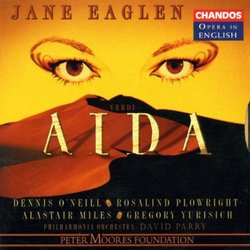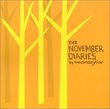| All Artists: Giuseppe Verdi, Jane Eaglen, Dennis O'Neill, David Parry, Philharmonia Orchestra Title: Aida (Sung in English) Members Wishing: 0 Total Copies: 0 Label: Chandos Release Date: 2/26/2002 Genre: Classical Styles: Opera & Classical Vocal, Historical Periods, Modern, 20th, & 21st Century Number of Discs: 2 SwapaCD Credits: 2 UPC: 095115307427 |
Search - Giuseppe Verdi, Jane Eaglen, Dennis O'Neill :: Aida (Sung in English)
 | Giuseppe Verdi, Jane Eaglen, Dennis O'Neill Aida (Sung in English) Genre: Classical
In this opera-in-English Aida, the translation is awkward (though faithful to the original) and only partly comprehensible (mostly from the male singers), the conducting is exciting, and the sound is vivid. Soprano Jane Ea... more » |
Larger Image |
CD DetailsSynopsis
Amazon.com In this opera-in-English Aida, the translation is awkward (though faithful to the original) and only partly comprehensible (mostly from the male singers), the conducting is exciting, and the sound is vivid. Soprano Jane Eaglen excels in the title role, especially in Aida's more openly dramatic moments, when her big, appealing voice can ring out. When she tries to scale it back in intimate scenes, the sound gets thin and unhealthy-sounding. Dennis O'Neill is a passionate, moving Radames, but his voice is often under strain. Rosalind Plowright is miscast as Amneris (the role needs a chesty mezzo, not an aging soprano), but she offers thrills in her big scenes. Gregory Yurisch's performance as Amonasro is all-around wonderful in its single-minded patriotism and anger. The smaller roles are superbly sung, with Susan Gritton's Priestess an absolute beauty. There are many finer performances of this opera available (Caballe and Domingo, Price and Vickers, and a very inexpensive Arroyo and Domingo) if it's just an Aida you want. But those who want either opera in English or soprano Jane Eaglen will need this interesting release. --Robert Levine Similar CDs
|
CD ReviewsExciting but incomprehensible BDSinC | Calgary, Alberta, Canada | 07/01/2005 (3 out of 5 stars) "I think it is quite brave of Chandos to issue another famous opera in English. The sad thing about it, especially if hearing it in English is supposed to make the experience more fulfilling for English speaking audiences is we understand even less of the words than we do when we hear it in Italian. This has been my major complaint with all their opera in English recordings. I may as well have listened to them in the original language, for I would have gotten more out of them. Opera singers these days cannot sing clearly in English at all. Yet, I have recordings from back in the ancient days of recording and the singers sang with flawless English, even if it was NOT their language. Again, it all related to the super clear diction that was part of their training and has been lost today with the desire for perfectly poised sound. Even clear diction in the native language of the opera (in this case Italian) is more often than not muddled these days. I just watched a PBS airing of Renee Fleming singing Strauss' Four Last Songs, and she may as well have told us she was vocalizing the melodies, for not one word was understandable. We, as listeners, are becoming too complacent and allowing poor performances because we concentrate only on pretty sound and not the message being conveyed. In this recording, the message is conveyed by no one. I have noticed that nearly all the reviews of this recording have nothing whatever to do with this recording. The longest one is really of a reissuing of a recording with Nilsson and Corelli and is sung in Italian. Really, Amazon must be more careful in allowing reviews that are of different products (the wrong products) to be listed as they mislead the public. And all the reviews talking about "black dog" give no indications about this recording at all, which is NOT a historical recording. Since it is obvious I am not that thrilled with this recording, why rate it highly? One thing is, the singers do have wonderful voices, and the conductor is very interested in keeping the forward motion in the work, which do add to the excitement. Some think Eaglen is miscast in this role, and in a way she is. However, her singing is true. What is her problem, and it is very noticeable when comparing her singing of a recording with a live performance, is her vocal center, her focus, just doesn't record well at all. Her voice is so hallow sounding it sounds nearly and constantly below pitch. She also sounds lifeless and uninvolved. However, nothing is further from the truth when one hears her in person. She is electrifying, she has ring in her voice, it is truly a huge voice (but never pushed or forced, and her pianissimo is NEVER pinched as it sounds in recordings). It is also a very warm voice. Yet, I have to admit, there is not a single recording she has made in the studio that has impressed me one tiny bit. The technicians simply cannot capture her voice. Her diction is passage at best, even in live performances, and is down right unintelligeable in English. Plowright has never been a favorite singer of mine. I find her voice too pushed most of the time, and even while singing soprano roles she didn't do it for me at all. She had a terrible time starting her career, and she had lots of bad advice that nearly ended it before it began. She did find instruction that finally got her going, but she never developed into a really excellent singer or performer. However, on stage, she, too, can be very exciting, and this recording does NOT capture that at all. She is definitely miscast as Amneris, for she hasn't the low notes to make the role work, nor has she the subtle nuances to develop the character. I blame that not on her so much as on the horrible translation she is singing, since it is completely awkward and at times at odds with the vocal line, it leaves her lost. None of the men, though capable, did a thing for me, even though as a rule they were understandable. That fact alone make it clear that whatever poetry was in the libretto in Italian was lost and became sort of stupid sounding when in English. Then combining their clear diction with the mush the women sang only made the duets really a mess. Believe it or not, unless you have super diction and a super singable translation that can be understood (even if it is not completely faithful to the original language) opera in English doesn't work. It comes across as opera in gibberish. Many people just coming to opera have leveled the eternal complaint one hears in English speaking countries, "You can never understand what they are singing about." Usually this refers to the language barrier because someone doesn't speak the language of the opera. In this case it is because you can't make heads of tales out of what is being sung. It is two and a half hours of vocalizing, emotional vocalizing to be true fully supported by a wonderful orchestra, but vocalizing just the same. We are hearing nothing and we are actually understanding nothing. Singing the entire opera to "Ah" and "OO" would have been just as emotionally effective." An English Aida to entertain and frustrate Ed Beveridge | London, England | 03/27/2002 (3 out of 5 stars) "This is another creditable addition to the opera in English canon of Chandos. It is certainly no small undertaking and it's also strikingly brave to attempt an opera recorded so frequently and by all the greatest singers. By and large, this recording works, though it's not without its flaws.Diction is fair-to-middling. The translation has its moments but often extra syllables get added or swallowed. I've not previously regarded English as an awkward or unmusical language (and I have heard other Verdi in English)which makes me think the translation is not ideal. The orchestra and chorus are pretty impressive, not earth-shattering, and David Parry perhaps drives things somewhat relentlessly. There's a little untidiness in some of the ensembles, but the Act 2 finale builds up a fine head of steam. And the singers? Well, Jane Eaglen is clearly the draw of this set and I must say she makes a decent fist of a challenging part. Particularly challenging for a heavy Wagner voice as it lies high and requires a lot of floated notes above the stave. She succeeds better than other big voices I have heard in this music, and if the top C in "O Patria Mia" is flat by a whisker, the aria is sung with appealing melancholy. Elsewhere she lets rip to thrilling effect. Eaglen isn't a touching or vulnerable Aida, but she is an impressive and intruiguing one. O'Neill has led the field as Radames for some time, and he demonstrates his mastery of the role here, even if the wobble in the voice is becoming difficult to ignore. A lovely B flat in "Celeste Aida" - again, more glamorous singers have failed where O'Neill succeeds. Plowright still has some gorgeous, firm and fruity tone in the middle to upper part of the voice. She doesn't sound like a "real" Amneris, but she acts the part to perfection, even when that means snarling, growling and sacrificing the melodic line. Yurisich is an unexceptionable Amonasro (not Verdi's most inspiring Baritone part), Rose is a disappointing King, Gritton as the priestess is a delightful cameo.All in all, a mixed bag, but certainly has enough to recommend it, not least at the bargain price." Let down by a poor Aida Ed Beveridge | 03/18/2002 (2 out of 5 stars) "It's good to have a new recording of Aida in English. Unfortunately, this project has been spoilt by a major flaw, and that is the casting of Jane Eaglen in the title part. Not only is Miss Eaglen's performance cool and dispassionate, her voice often turns ugly above the stave. Her performance leaves much to be desired both vocally and dramatically. O'Neill is a good Radames and Plowright, having turned to the mezzo repertoire, is a vivid Amneris. The other roles are adequately taken and the orchestral playing is good without being remarkable. Anyway, a recording of Aida without a proper Aida cannot be recommended. Thus, I can only award it with 2 stars."
|

 Track Listings (33) - Disc #1
Track Listings (33) - Disc #1

